- The Chehaw Massacre and Lott Warren
- The Chehaw Expedition
- Attack on Aumuculle
- Lott Warren and the Arrest of Obed Wright
When Georgia militia troops attacked the friendly Aumuculee (Chehaw) Native American village in 1818, the nation was scandalized.
Let not the “star spangled banner” of our country be for a moment polluted with so foul a blot – Augusta Chronicle, May 16, 1818
The friendship of Aumuculle had been long known. During the Red Stick War (1813-1814), the Aumuculle chiefs had repeatedly demonstrated their friendship and loyalty to the U.S., and to the state of Georgia. Aumuculle had provisioned troops during the construction of Fort Early and sent 40 of their warriors to join the command of Andrew Jackson in his campaign against the Seminoles, who in the Creek language were called the Iste-Semole – the wild men. Despite this record, the village was massacred by Georgia militia, under the supposed justification that the attack was a reprisal for earlier Indian depredations.
The attack itself was widely publicized with contradicting reports and a running dispute between General Andrew Jackson and Georgia governor William Rabun. Their dispute over military jurisdiction became so controversial, President James Monroe was required to furnish Congress with a complete set of the correspondence relating to the incident.
Lott Warren, who had been present at the massacre and who followed orders to loot and burn the Native American houses, now had a small role to play in the capture of the perpetrator of the attack, Captain Obed Wright. Warren would go on to serve as Solicitor-General of the Southern Circuit, including Lowndes County, GA. In 1826 Warren prosecuted two Native Americans before Judge Fort in Thomas County, GA for murder, securing a conviction and sentence that they be “hung by the neck until they were dead. The judge omitted to invoke the usual blessing, – “May God have mercy on their souls!” – for the reason that the prisoners did not understand English.” Warren became an ardent supporter of the “States Rights” cause. Among the state rights he was most concerned with were the right of Georgia to incarcerate Native Americans without interference from the Federal Government, and the right of Georgians to retrieve “fugitive slaves” from other states. Lott Warren was a “slave owner”, as shown in the 1860 Census of “Slave Inhabitants” of Albany, Dougherty County, GA. Elected to the Georgia state legislature, he supported Indian Removal and Georgia’s defiance of U.S. Supreme court rulings that favored Native American rights. Warren supported the expulsion of sympathetic missionaries from the Indian Territory, and the execution of Corn Tassels for a crime committed in the Indian Nation. He was elected to the U. S. House of Representatives where he vehemently defended the character of Governor William Rabun and Rabun’s assertion states’ rights.
∫∫∫
Following the attack on Aumuculle (Chehaw), Obed Wright, commanding officer at the Chehaw Massacre, and the militia companies under his command had been discharged at Hartford, GA and had returned to their homes. Lieutenant Lott Warren returned to Dublin, GA and resumed his work as a clerk in the store of Amos Love. Warren’s employer, Amos Love, was the father of Peter Early Love who became a leading statesman of Georgia, serving as a solicitor general, superior court judge and U.S. Congressman. Peter Early Love was a judge on the Southern Circuit. Judge Love was a former Solicitor General serving old Lowndes County, GA, and presided at the first session of the Superior Court held in Berrien County in 1856. He was elected as a U. S. Congressman and was among the southern representatives who walked out of Congress when Secession was declared. Amos Love’s granddaughter, Mattie Love, would marry during the Civil War to Private Robert Hamilton Harris of the Thomasville Guards, Company A, 29th Georgia Regiment.
Meanwhile, pursuant to orders from General Andrew Jackson, Major John M. Davis commenced tracking down Captain Obed Wright to secure his arrest.
Arriving in Hartford in mid-May, 1818 Major Davis found Captain Wright had already departed for Savannah, GA. Davis pursued, first going by way of Fort Hawkins and Milledgeville. Major Davis finally tracked Wright to Dublin, GA. There, Davis sought out Lieutenant Lott Warren. In a statement to the U.S. Congress, Lott Warren later recounted, “Major Davis called upon me, and in great confidence disclosed his business, and inquired for Capt. Wright, to whom in a few minutes I introduced him…” – Georgia Journal, 26 Apr 1842
Major Davis… stated that he had orders from Gen. Jackson to arrest Capt. Wright. Lieut. Warren accompanied him to the hotel, where he introduced him to Capt. Wright, who at once submitted. It may as well be remarked here that Capt. Wright had not been mustered into the service of the United States, and was, of course, not subject to the orders of Gen. Jackson. His arrest, by the authority of the latter, was therefore regarded by Gov. Rabun and the justices of the Inferior Court of Baldwin county, as a usurpation of power.
♦
Major Davis presented Captain Wright with an official, written letter of arrest.
Capt. Obed Wright, Georgia militia
Dublin, Georgia, May 24, 1818
Sir,
I am directed by major general Jackson, commanding the division of the south, to arrest you and conduct you to fort Hawkins, where you are to remain, until the pleasure of the President of the United States, be known on your case.
You will therefore, consider yourself in arrest, and proceed accordingly.I am, respectfully yours, &c.
JNO. M. DAVIS
Ass’t inspr. gen. U.S. Army.
Having taken Captain Wright into custody, Major Davis proceeded with his prisoner toward Fort Hawkins, at Macon, GA. Wright prevailed upon Davis to go by way of the state capitol at Milledgeville, where he said he had papers important to his defense. At Millegeville, however, Wright attempted to escape… or at least to delay the march long enough for his attorney to file legal proceedings.
Extract of a letter from a gentleman in Milledgeville to his friend in Raleigh, (N.C.) dated June 4.
Our metropolis has been in considerable commotion for several days past. Captain Obed Wright, the murderer of the friendly Indians, was arrested by order of gen. Jackson, the first of last week below this, and at his request was permitted to come to this place [Milledgeville], for the purpose of procuring some papers which he said would be necessary at his trial. On Thursday morning last, when the officer [Major John M. Davis] was about to proceed on his journey, the prisoner broke ground, and moved with such velocity that he succeeded in reaching the top of one of our longest hills before he was overtaken by persons on horseback. His conduct so enraged the officer, that he looked as if he intended severing the fellow’s head with his sword, which he “waved in fiery circles” (as Weams would say) above the trembling prisoner, who looked as if he expected every moment to meet old Howard in another world. This affair afforded time enough for a friend of Wright to procure a writ of habeas corpus, which was served on the officer, and he notified to attend a court called to try the case, in a few hours. The court decided that the orders of gen. Jackson were informal, as they contained no charge for which the prisoner was arrested, or to be tried – Jackson simply directs the officer to arrest and confine him until instructions can be received from the president. The prisoner was discharge, and the officer went off, cursing our governor and the whole state and threatening us with vengeance, to tell gen Jackson how he had been treated, who has never shewn much courtesy towards our chief magistrate. Jackson considered Wright in the service of the United States, and our governor thinks he was in the service of this state. There is much difference of opinion on the subject. The governor is censured, generally – perhaps justly too. – The New York Evening Post, 25 Jun 1818
Wright’s attorney, Seaborn Jones, filed the writ of habeas corpus with the Inferior Court of Baldwin County, Milledgeville;
Chambers, May 28, 1818
Present: Their honors Robert Wynn, William Bevin, and James Fleming, Justices.
The court met for the purpose of hearing Obed Wright, who was brought up before them upon a writ of habeas corpus, which is as follows:
Georgia, Baldwin county.
To any Justice of the Inferior Court.
The petition of Obed Wright showeth: That he is detained in confinement by Major Davis, an officer in the United States service, and he therefore prays the benefit of a habeas corpus, to inquire into the cause of his confinement and detention.
Seaborn Jones
Attorney for petitioner.
Pursuant to the petition, a writ of habeas corpus was issued by the court.
Habeas corpus, by the Constitution of the United States, and of the State of Georgia.
To Major Davis,
an officer in the United States service.Georgia, Baldwin county:
It appears, from the petition of Obed Wright, that he is now kept in custody by you, and he having prayed a writ of habeas corpus, you are, therefore hereby commanded, that you bring before me, at the court-house of the county, by the hour of 11 o’clock of the forenoon of the day, the body of the said Obed Wright, by whatever title he may be known to you, together with the cause of his commitment and detention, that he may be dealt with according to law. Fail not, and have you then and there this writ.
Given under my hand and seal, the 28th of May, 1818.William Bevin, J. I. C.
Major Davis produced Obed Wright in court in Milledgeville, GA
Milledgeville, May 28, 1818
I have the said Obed Wright in court, together with the cause of his commitment and detention.
John M. Davis,
Ass’t Inspector General U.S.A.
After hearing the case, the court ordered the immediate release of Obed Wright.
Major John M. Davis, assistant inspector general of the United States’ Army, in obedience to a writ of habeas corpus, this day served on him, having produced the body of said Obed Wright, mentioned in the habeas corpus, before the court, together with the cause of his commitment and detention:
And the court, on consideration, deeming that no sufficient cause is shown for his detention: on motion, ordered, that he be discharged forthwith.
Robert Wynn.
William Bevin.
James Fleming.
Upon reaching Fort Hawkins, Major Davis wrote a letter to Gen. Jackson explaining the circumstances of Wright’s release:
Fort Hawkins 30th May 1818
Sir,
By express I hasten to communicate to you, that in pursuance of your order to me of the 7th inst. I came up with Captain Obed Wright of the Georgia Militia, in Dublin on the 24th Inst. I arrested him, and brought him on with me as far as Milledgeville, where civil authority interfered and discharged him. A copy of the proceedings is herewith enclosed to you – I also enclose you copies of my letters to the Secy. War, & Govr. of Georgia, together with a copy of your order to me (which you kept no copy of) – and a copy of Wright’s arrest.
So far as I have had an opportunity of discovering, the minds of the Georgians is much agitated on this occasion, and many of them warmly advocate Wright’s conduct – I had to brook several insults while I had him in custody – The General impression of the rable was that Wright would be delivered up to the Indians – The enlightened class new better, & said that you were incapable of doing such an act – I did not let the court know the extent of my orders -I only shew my first order, which directs him to be delivered over to the military authority at Fort Hawkins there to be kept in close confinement untill the will of the President be known. The Govr. of Georgia is absent at present, whether he will on his return order him to be delivered over to me on my application, or not is uncertain, I dont expect he will.
I deem it necessary & therefore have communicated the facts as herein related to the Secy. War, I have enclosed him a copy of the proceedings of the court, and a copy of Wrights arrest – I notified him that I have communicated the circumstance to you.
I have the honor to very Respectfully your Obt Sert
Jno. M. Davis
Asst Ins. Genl
♦
Augusta Herald
Friday June 5, 1818
Milledgeville, June 2.
Capt. Wright —Major Davis, of the United States army, in compliance with orders from General Jackson, arrested Captain Obed Wright in Dublin, a few days ago, for the purpose of carrying him to Fort Hawkins, and securing him until instructions could be received from the President. Whilst in this place, on Thursday last, the prisoner was released from custody by a writ of habeas corpus, before a Court called to determine the case. The Court, after suitable investigation, decided that the orders of Gen’l Jackson were informal, as they contained no specific charge against the prisoner, who was accordingly released from custody. We understand Capt. Wright has been arrested by order of Gov. Rabun, and is now on parole in this place, waiting the organization of a court-martial.
Meanwhile, among the Creeks there was growing resentment over the attack…
Milledgeville Reflector
June 2, 1818The Chehaw Indians estimate the property lost by the late attack on their town, at $8000. We understand that there will be a general meeting of the Creek Nation at Fort Mitchell on the 7th instant, for the purpose of investigating the late affair.
On June 28, 1818, President James Monroe finally wrote,
An officer of rank should be ordered to visit the Chehaw town in the name of the executive of the United States, to examine into the loss and damage that indemnity may be made and to console the survivors.
♦
In a letter dated July 8, 1818, Nashville, Tennessee Major General Andrew Jackson informed Creek leader General William McIntosh that he had ordered the arrest of Captain Obed Wright for the “wanton outrage and murder” at Chehaw, but that Wright had been released by civil authorities in Milledgeville. Jackson wrote that he was awaiting President Monroe’s instructions on how to proceed further in the matter.
Head Quarters
Division of the South
Nashville 8 July 1818
General William McIntosh.
Friend and BrotherShortly after the capture of Pensacola, I was taken very ill which prevented my writing you; I have continued indisposed ever since & on my return to Nashville was taken seriously ill, — From this attack I have just recovered sufficiently to write you —
On my march from Fort Gadsden to Pensacola I received the disagreable intelligence of the wanton and outrageous attack by Capt Wright, commanding a detachment of Georgia Militia, on the Chehaw Village — I immediately sent the Chehaws a talk which you have seen, and ordered Capt Wright to be apprehended & confined for trial. Major Davis executed this order, arrested Capt Wright, and in passing through Milledgeville, Capt Wright was released from his confinement by the Civil Authority. I am awaiting the instructions of your Father the President of the United States on this subject. That Capt Wright ought to be punished for this wanton outrage and murder all good men agree, and I have no doubt Your Father the President of the U. States will have ample justice done in this case —
Your Friend & Brother
Andrew Jackson
Major Genl Comdg
♦
After the discharge of Capt. Wright, upon Habeas Corpus, at Milledgeville, the Governor had him immediately arrested for disobeying orders, in not destroying the Hoponee and Philemi towns, as well as Chehaw,… – Portraits of Eminent Americans. However, Wright while still officially under arrest was soon released on a “parole of honor” pending instructions from the President on the disposition of the case.
Secretary of State John Quincy Adams followed up with another letter to Governor Rabun, telling him that “The President of the United States has directed that Captain Obed Wright should be prosecuted for the murder of friendly Indians.” – Massacre of American Indian Allies, 1818
The Savannah Republican reported the instructions from President Monroe; Captain Wright would be tried before justices of the Supreme Court, and if convicted, would be executed. In a second article The Savannah Republican explained to the legal authority to prosecute Wright in federal court.
Savannah Republican
July 14, 1818The President has issued orders for the arrest of captain Obed Wright, which the marshal of this district will execute forthwith. A special court has also been ordered for the trial of Wright, to be held in September next, in this city, or Milledgeville, at which two of the judges of the supreme court are to preside. Wright is charged with having committed murder, and the destruction of the Chehaw town.
Savannah Republican
Milledgeville, July 23.
The law of Congress passed in 1802 to regulate trade and intercourse with the Indian tribes, and to preserve peace on the frontiers, under which Captain Wright is to be tried, enacts, that “if any citizen, or other person, shall go into any town, settlement, or territory belonging to any nation or tribe of Indians, and shall there commit murder, by killing any Indian or Indians, belonging to any nation or tribe of Indians in amity with the United States, such offender, on being thereof convicted, shall suffer death.”
“And when the offender shall be apprehended or brought for trial into any of the United States, it shall be lawful for the President of the United States to issue a Commission to any one or more Judges of the supreme court of the United States, and the judge of the district in which such offender may have been apprehended, or shall have been brought for trial; which Judges, or any two of them, shall have the same jurisdiction, in such capital cases, as the Circuit Court of such district, and shall proceed to trial and judgement in the same manner, as such circuit court might or could do.”
For the immediate attainment of the objects of the general government in relation to captain Wright, the acting attorney of the United States for the district of Georgia, (Mr. Davies having temporarily left the state for the benefit of his health, which has been considerably impaired by an incessant devotion to business) has written to the Creek agent for Indian Affairs, we are informed, requesting him to pursue such steps as will authorize the Marshal to take captain Wright into custody; and the Governor has been desired to cause him to be delivered to any judicial officer of this county, whenever he shall be demanded by virtue of a warrant from the proper authority, and to detain him, till then, under his present military arrest. – Journal.
Wright heard that rather than facing a military court martial he was to be tried before a federal court as soon as federal charges could be preferred. He petitioned Governor Rabun for immediate release from his arrest, but receiving no reply decided to flee from justice.
ESCAPE OF CAPTAIN WRIGHT.
From the Milledgeville Journal, 4th instant.
Capt. Wright, of noted memory, has broken his parole of honor, and absconded. On the 26th ult. [July 26, 1818] (the day previous to his dissappearing) he addressed the following note to the governor;-“Sir – On the 28th of May last, I was arrested by order of your excellency. Since that time I have waited in the expectation, that a courtmartial would be ordered for my trial. No charge has yet made its appearance against me. I therefore pray that your excellency would withdraw the arrest. If you should think proper not to do so, suffer me to call and see you, as I have business of importance. (signed) Obed Wright.”
To this communication no answer was returned. His fears, we understand, were considerably excited by the statement in the Savannah Republican, of the determination of the president of the U. States to have him tried before the federal court for murder. Dreading a long and loathsome imprisonment in gaol [jail], and probably apprehending, from the “hue and cry” which had been raised against him, that his conduct would not be impartially investigated, he took the fatal resolution to flee from justice.
A reward of 500 dollars has been offered by the executive for his apprehension. The deputy marshal and assistant agent for Indian affairs, arrived here on Thursday with a warrant to take him into the custody of the civil authority- but the “bird had flown.” – Savannah Republican, Aug 8, 2018
Governor Rabun then informed Secretary of State John Quincy Adams that Wright had fled.
Executive Department of Georgia
Milledgeville, 29th July, 1818SIR
I have had the honor to receive your letter of the 30th ultimo, containing the determination of the President of the United States relative to the case of Captain Obed Wright; and was highly gratified that the affair should be brought before the civil authority of the United States, where, I have no doubt but ample justice would have been administered.
I had determined to detain him agreeably to your request, and would have cheerfully submitted him to the custody of the marshall, whenever he might have appeared; but the President’s instructions to the District Attorney were unfortunately made public in the newspapers of Savannah, and from them copied into others, and were thereby improperly communicated to captain Wright, who, being alarmed at the prospect that awaited him, (on the night of the 27th inst.) made his escape from the custody of the Adjutant General of this state, *who had been instructed to arrest and detain him) and I have received no information of him since.
I shall use every possible exertion to cause him to be arrested again, and hold him subject to the proper authorities of the United States.
I have the honor to be, Sir, very respectfully, your most obedient and very humble servant,
WM. RABUN
Hon. John Quincy Adams, Sec’y. of State.
Governor Rabun issued a proclamation offering a reward of $500 for the apprehension of the fugitive Obed Wright.
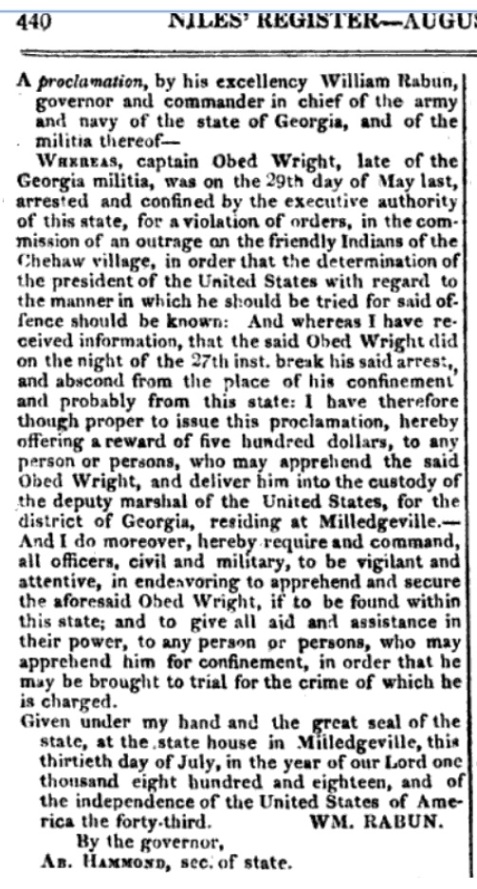
July 30, 1818, Proclamation of Governor William Rabun offering $500.00 reward for the capture of Captain Obed Wright.
A proclamation, by his excellency William Rabun, governor and commander in chief of the army and navy of the state of Georgia, and of the militia thereof-
Whereas, captain Obed Wright, late of the Georgia militia, was on the 29th day of May last, arrested and confined by the executive authority of this state, for a violation of orders, in the commission of an outrage on the friendly Indians of the Chehaw village, in order that the president of the United States with regard to the manner in which he should be tried for said offence should be known: And whereas I have received information, that the said Obed Wright did on the night of the 27th inst. break his said arrest, and abscond from the place of his confinement and probably from this state: I have therefore though proper to issue this proclamation, hereby offering a reward of five hundred dollars, to any person or persons, who may apprehend the said Obed Wright, and deliver him into the custody of the deputy marshall of the United States, for the district of Georgia, residing at Milledgeville.- And I do moreover, hereby require and command all officers, civil and military, to be found within this state; and to give all aid and assistance in their power, to any person or persons, who may apprehend him for confinement, in order that he may be brought to trial for the crime of which he is charged.
Given under my hand and the great seal of the state, at the state house in Milledgeville, this thirtieth day of July, in the year of our Lord one thousand eight hundred and eighteen, and of the independence of the United States of America the forty-third.
WM. RABUN
By the governor,
AB. HAMMOND, sec. of state.Obed Wright is supposed to be about 30 years of age, 5 feet 11 inches high, slender, trim built, said to be very active, fair complexion, light blue eyes, and light brown hair. – Lancaster Intelligencer, 22 Aug 1818
In plotting his escape, Wright turned to Jacob Robinson, who had been his second in command at the Chehaw massacre. Robinson would later be court-martialed for falsifying the payroll report for the service of his men at Chehaw, keeping the excess pay for himself. “And in that trial his loyalty to Wright and his part in effecting his escape was brought out. A witness testified that Wright had gone to Robinson’s home in Laurens County and informed him that the Governor had “released him from under arrest,” and told him “that he had to fly his country,” and that Robinson helped. A third witness testified that Robinson had told him that he had “hope” Wright along by giving him “a wooden horse [canoe]” in which to float down the Ocmulgee River, and that by now he was in Florida or “gone on to South America.” A fourth witness stated that Wright had said that a United States marshal was going to arrest him and keep him in jail in irons and that his health would not stand it, but that he was willing to be tried if at once. Robinson, himself, testified that Wright called at his home “on his way to the low country,” stating that his arrest had been withdrawn, “and that a different course would be pursued and to contend with the ilnature and influence” of Jackson he could not, “that being destitute of friends and money, that confinement in a common jail would be death,” and that his health could not stand it, he had decided to leave. Robinson said, “I treated the man with that hospitality honest men at all times receive in my house. I permitted him to take a canoe of mine which I felt willing to spare.” – The Chehaw Affair
From Dublin, GA Wright could have canoed down the Oconee River some 50 miles to where the river merges with the Ocmulgee River near Lumber City, GA to form the Altamaha River. The Altamaha then flows some 130 miles to Darien, GA at the mouth of the river. By land or sea, Wright made his way to Spanish Florida. In a story that was picked up by national newspapers, The Savannah Republican reported that Wright had been spotted at St. Augustine, FL.
Savannah, Sept. 8
From the South. – We have just seen a gentleman from St. Augustine, who informs us…that he saw captain Obed Wright in St. Augustine – that he had taken a Spanish protection, and intended in a few days to go to the Havana. -The United States Gazette, 19 Sep 1818
President Monroe consulted with Secretary of State John Quincy Adams, Secretary of War John C. Calhoun, and Attorney General William Wirt regarding the propriety of issuing a proclamation offering a reward for the apprehension of Obed Wright. The Attorney General advised that the President should instead seek an indictment from the next grand jury for the circuit court of Georgia. If Wright was indicted a federal warrant would be issued and the president could offer a reward for his arrest. U.S. marshals and federal authorities would be instructed that “if Wright should make his appearance anywhere within the United States, to cause him to be arrested according to law.” – Washington Daily Union, May 26, 1850
Possibly reflecting upon Andrew Jackson’s lack of respect for the sovereignty of the Spanish government in Florida, Obediah Wright decided to place a little more distance between himself and the U.S. authorities. By November Wright was spotted in Havana, Cuba.
From Havana. – Mr. Topliff’s correspondent at Havana writes him as follows, under date of Nov. 21 [1818]:… Capt. Obed Wright, late of the U. S. army, arrived here a few days since from St. Augustine. Capt. Wright was of the Georgia militia. – New York Evening Post, 14 Dec 1818.
♦
National Intel.
A resolution has passed both branches of the Georgia Legislature, without a dissenting voice, exculpating the Governor from any blame on account of the unfortunate attack on Chehaw town, and the escape of Obed Wright. – Vermont Intelligencer, 21 Dec 1818
Wright was never heard from again, and no one was ever held legally responsible for the massacre of the Chehaws.
In 1912, the Daughters of the American Revolution dedicated a monument commemorating the Chehaw Massacre.
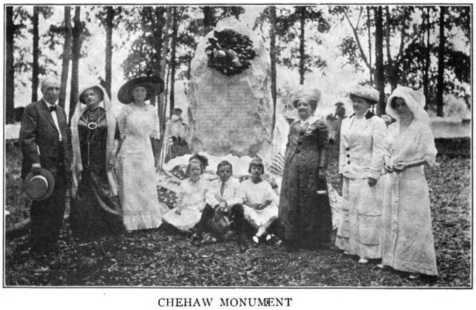
Chehaw Monument dedicated June 14, 1912 by the Council of Safety (Americus) Chapter of the DAR. The Atlanta Journal said the monument commemorated “the bloody massacre of innocent tribesmen, women and children by Captain Obed Wright, commanding a company of Georgia Militia, in 1818. The memorial is intended as a slight reparation for the great wrong thus done against a tribe of friendly Indians, and at a time when the men of the tribe were fighting in the ranks of Gen. Andrew Jackson’s two regiments sent against the Seminoles in the Florida Everglades in 1818.” The inscription reads: Large Indian town, home of the Chehaws, a friendly agricultural people of the Creek Tribe, who aided our early settlers. They contributed men, food and horses to subdue the hostile Seminoles; Here Andrew Jackson rested with his starving army and was given help in 1818. Here also in 1818, through misunderstanding, were massacred seven of this tribe by Georgia troops, for which all possible amends were made. Erected in 1911 by Council of Safety Chapter, D. A. R.
Council of American Safety [Chapter of the DAR]. (Americus, Ga.) – Chehaw monument, near Leesburg, Ga., erected by the Chapter, was unveiled June 14th, 1912. The picture shows a scene after unveiling, and those of the rostrum who took part in the exercises on this occasion, follows from left to right: Mr. J.E.D. Shipp, orator; Miss Anna Caroline Benning, a former State Regent; Miss Annie May Bell; the three children who unveiled the monument: Lucy Simmons, Frank Harrold, Jr., Louise Dudley; Mrs. William Lawson Peel, Vice-President General; Mrs. Charles A Fricker, Chapter
We have done other good work, but erecting this monument by our Chapter is the greatest accomplishment since our organization five years since. Chehaw was an Indian town on the DeSoto Trail. The people were agricultural and friendly to our settlers. They were of the Creek tribe of Indians, and were of superior intelligence and civilization. In thus perpetuating the memory of this tribe, in recognition of their aid to our country, we emphasize the fact that Andrew Jackson, on his march in 1818, to subdue the uprising Seminoles in Florida, rested at Chehaw, and to him were contributed by the natives, shelter, food and horses for his starving army.
This monument is located exactly where stood the great “Council Oak” of the Chehaw Indians, a tree famous for its great size. The trunk was 8 feet in diameter, covering a space of 120 feet across, the outer circumference being clearly defined by a circle of oaks of perfect symmetry, sprung from the acorns dropped from the outspreading branches of the old tree, making one of the loveliest spots in Georgia. – Mary Charlton Fricker, Regent
Related Posts:
- Judge Lott Warren
- The Chehaw Massacre and Lott Warren
- The Chehaw Expedition
- Attack on Aumuculle (Chehaw)
- Lowndes Grand Jury of 1833
- Hamilton Sharpe and the Electoral College
- An Antebellum Trial at Troupville
- Isham Jordan Fought Indians, Opened Early Wiregrass Roads
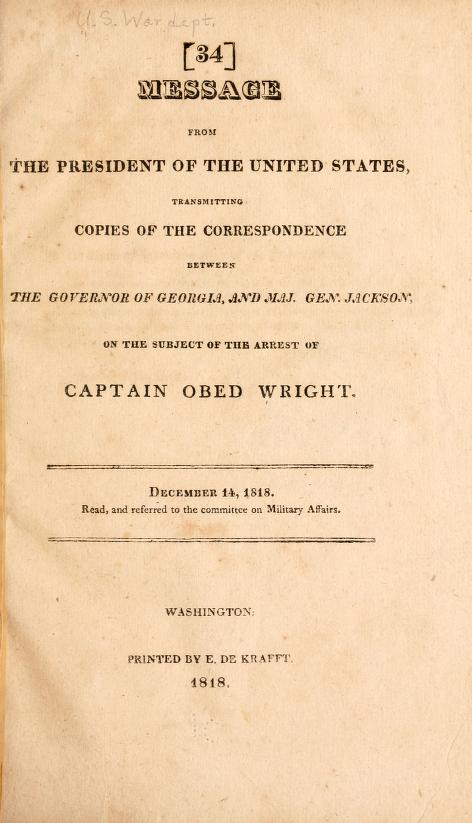

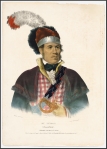
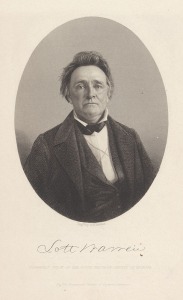
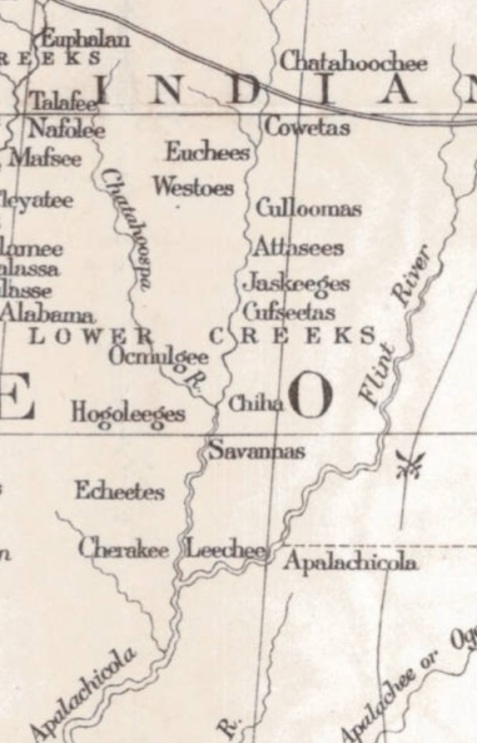
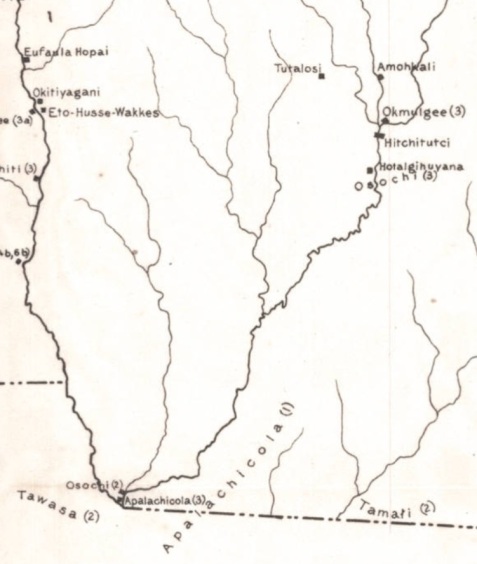
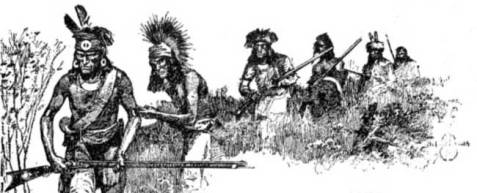
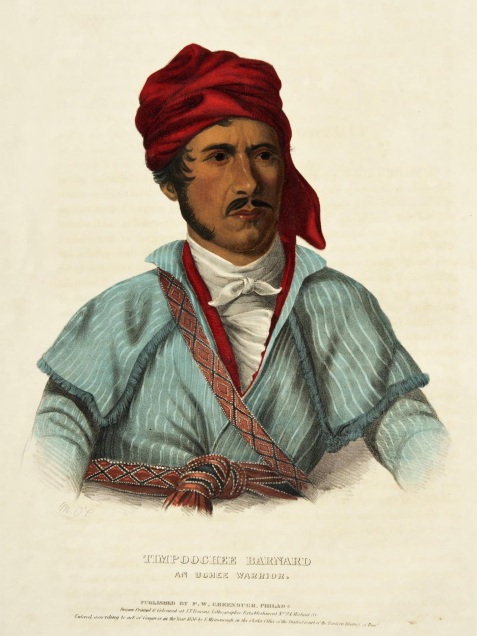
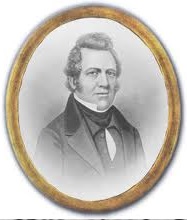
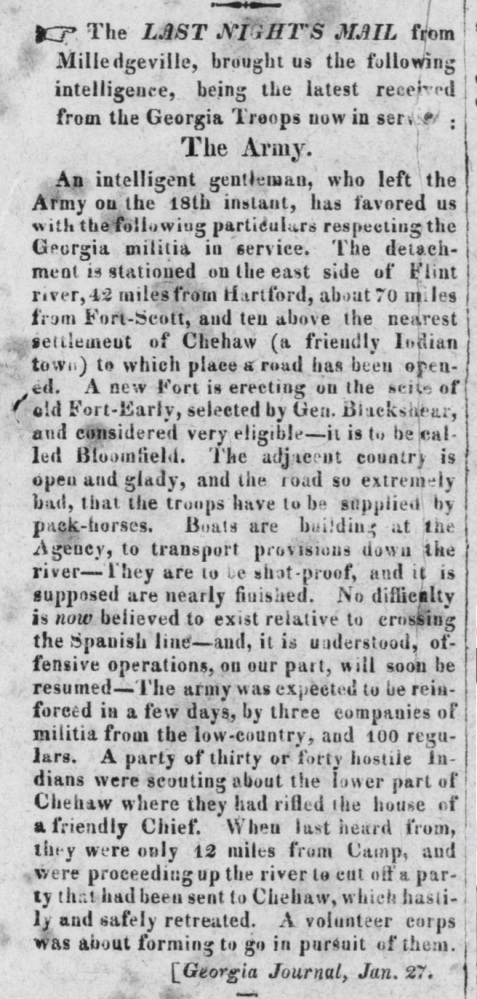
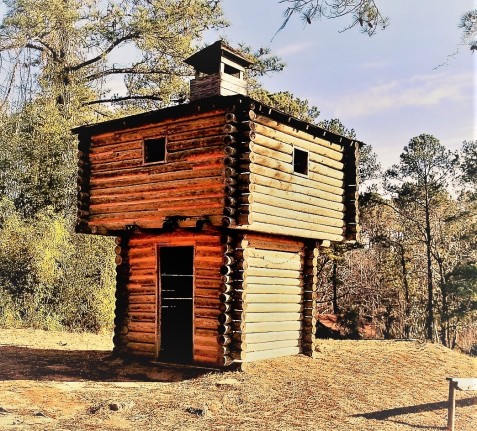
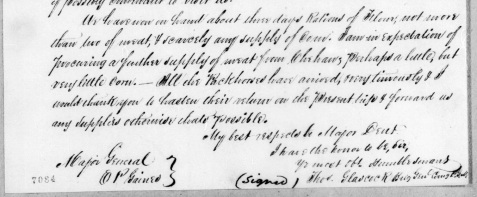
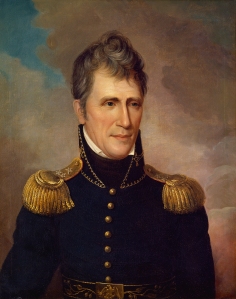

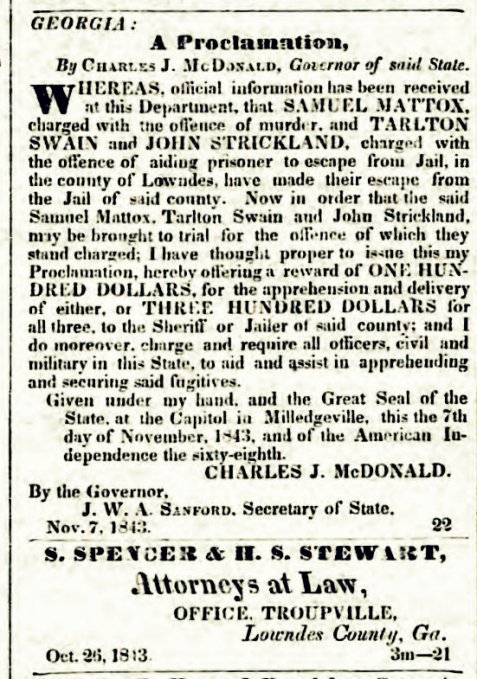

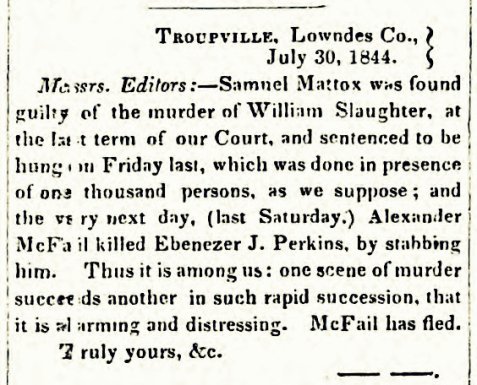
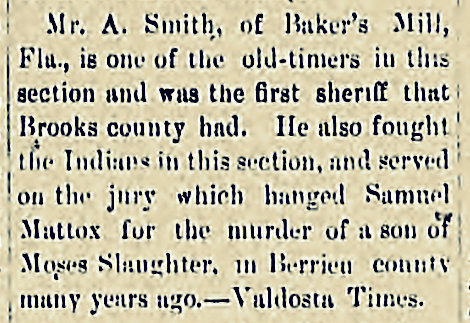
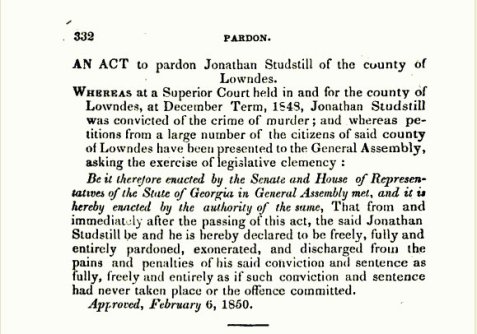
Judge Lott Warren
June 23, 2018 at 1:12 am (Franklinville of Old Lowndes County, Law and Order)
Tags: 1837 Convention of the State Rights Party, Albany GA, Ambrose Barber, Americus GA, Anti-Van Buren Convention, Augusta GA, Baptist Church in Americus, Battle of Chickasawhatchee Swamp, Bethel Association, Blackshear Road, Blackstone's Commentaries, Charles Culpepper, Chehaw Massacre, Cherokee Indian Territory, Constitutional Convention of 1877, Corn Tassels, Daniel McDonald, Daniel McNeel, Dublin GA, East Florida, Eli Warren, First Seminole War, First Seminole Ware, General Julius C. Alford, General Levi J. Knight, General Winfield Scott, Georgia Baptist Institute, Grand Jury of Telfair County, James Jackson Scarborough, James Pohill, Jane DeSaubleaux, John Lawson, Laurens County Militia, Lott Warren, Lowndes County GA, Lowndes County Grand Jury of 1833, Marion GA, Moses Fort, Nullification Crisis, Paul Coalson, Philema GA, Redden Wooten, Revolutionary War, Richland Church, Riverside Cemetery, Scott Convention of 1852, Solicitor-General of the Southern Circuit, Southern Circuit Court of Georgia, Sumter County Volunteer Militia, Talbotton GA, Thaddeus G. Holt, Thomas D. Mitchell, Twiggs County Free Trade & State Rights Association, Twiggs County GA, Twiggs County Temperance Society, United Effort Company, W. L. Mcree, Whig Party, William A. Graham, William H. Crawford, William H. Torrance, William Hardwick
Judge Lott Warren presided over the Lowndes County Grand Jury of 1833, at Franklinville, GA, the county seat of Lowndes which then included most of present-day Berrien County.
Lott Warren was the presiding judge on the Southern Circuit at the Lowndes County Grand Jury Presentments of 1833.
According to the History of Bethel Association,
His brother, Eli Warren, also became a lawyer and a judge, as well as a planter, state representative and representative to two Georgia Constitutional Conventions.
Commentaries on the Laws of England, by William Blackstone, are an influential 18th-century treatise on the common law of England by Sir William Blackstone, originally published by the Clarendon Press at Oxford, 1765–1769. The work is divided into four volumes, on the rights of persons, the rights of things, of private wrongs and of public wrongs. ” As an elementary book, however, it may be enough to say that the whole body of American lawyers and advocates, with very few exceptions, since the Revolution, have drawn their first lessons in jurisprudence from the pages of Blackstone’s Commentaries; and no more modern work has succeeded as yet in superseding it.”
That same year he became the guardian of his wife’s younger sister, Penelope DeSaubleaux, who was still a minor. He acted as an administrator, along with William L. Mcree, for his father-in-law’s estate, selling off DeSaubleaux’s enslaved people and Laurens County plantation for the benefit of the heirs.
Appointment of Lott Warren as an administrator of the estate of Louis P. DeSaubleaux and guardian of his minor child, Penelope DeSaubleaux
Lott Warren was temporarily serving as Solicitor-General of the Southern Circuit during the presentments of the Grand Jury of Telfair County at the June term, 1825. Among the jurors at that term of court were Redden Wooten, John Lawson, and Daniel McDonald, the three of which would later move to Lowndes County, GA. The presiding judge was Thaddeus G. Holt who that same year presided over the very first session of the Superior Court of Lowndes County, convened at the home of Sion Hall, and where Levi J. Knight served as foreman of the Grand Jury.
In March of 1826, Thomas D. Mitchell, Esq., Solicitor-General of the Southern Circuit, was killed in a duel with Dr. Ambrose Barber. Governor Troup made a recess appointment to place Lott Warren as Solicitor-General of the Southern Circuit, the appointment being ratified by the Legislature in November 1826. While in office, it became his duty to prosecute several Native Americans in Thomas County for murder. According to the Bench and Bar of Georgia,
Lott Warren served in this capacity to April, 1828, inclusive. He declined being a candidate for re-election.
In 1828, Lott Warren chaired a large public meeting held at the Twiggs County courthouse at Marion, GA to protest the “Tariff of Abominations” which had been enacted during Andrew Jackson’s administration. The tariff, which protected northern industry and was unfavorable to the Southern agricultural economy, would lead to the Nullification Crisis. On February 1, 1833, Lott Warren would play a prominent role in the formation of the Twiggs County Free Trade & State Rights Association; Thaddeus G. Holt served as the first chairman of that organization. The State Rights Party of Georgia would be launched in 1833 by prominent leaders of the Troup party, including William H. Crawford, John M. Berrien, George R. Gilmer, William C. Dawson, and Augustin S. Clayton. In Lowndes County, the effort to form a State Rights Association was led by William A. Knight, Levi J. Knight, Hamilton W. Sharpe, John Blackshear, John McLean, John E. Tucker, and William Smith at Franklinville, GA, 1834. At the Independence Day Celebration, 1834 at Franklinville, these men and other prominent citizens of Lowndes County repeatedly toasted Nullification in opposition to Federal authority. Among the state rights Lott Warren was most concerned with were the right of Georgia to incarcerate Native Americans without interference from the Federal Government, and the right of Georgians to retrieve “fugitive slaves” from other states. Warren himself was a “slave owner”, as shown in the 1860 Census of “Slave Inhabitants” of Albany, Dougherty County, GA.
Lott Warren had always been a warm supporter of Governor Troup. In 1830 he was elected to the state Legislature as the senator from Twiggs County and was seated when that body convened, but the election was contested. An investigation ensued in the Legislature, but ultimately his election was confirmed.
In the 1830s, Lott Warren became a prominent member of the Twiggs County Temperance Society. On July 28, 1832, he was present at the constitution of this organization and was elected its first president. He was a member of Richland Church. He served on the church committee organizing the protracted meeting of the United Effort Company held at Richland Church which commenced on the Friday before the second Sunday in May 1835.
In December 1834, in order to pursue his business interests, Lott Warren offered his Twiggs County property for sale; “577 and 3/4 acres of land, lying near Marion, most of it good planting land, finely timbered and well-watered; 200 acres in cultivation and in a good state for making a crop – also, a few hands, stock of horses, cattle, hogs, &c.”
In January 1836. Lott Warren moved from Marion County to Americus, GA. Following the Battle of Chickasawhatchie Swamp in the summer of 1836, he was among those presiding at a testimonial dinner at Americus, GA given in honor and gratitude for the “arduous service” of the Sumter County Volunteer Militia in the campaign “against the Creek Indians.” The Native Americans, resisting the forceful removal to the West and fleeing to Florida, also passed through Lowndes County where local militia companies engaged them at several locations including the Skirmish at Bill Parker’s Place, the Battle of Brushy Creek, actions on Warrior Creek, Skirmish at Cow Creek, actions on Little River and at Grand Bay, and the skirmish at Troublesome Ford.
In 1837, Lott Warren was a trustee of The Georgia Baptist Institute, at Talbotton, GA. “Talbotton is situated on the ridge of country dividing the waters of the Flint and Chattahoochee rivers, and directly on the daily stage rout from Washington City to New Orleans.” That same year he went into partnership with William H. Crawford, with offices in Americus, GA and providing legal services in Muscogee, Marion, Stewart, Randolph, Early, Baker, Lee, Sumter, Houston, Twiggs, Pulaski, Lowndes, Thomas Decatur and Dooly counties. In December 1837, at a Convention of the State Rights Party, Lott Warren was nominated as a candidate for the United States Congress. In the election of 1838, he won a seat in the the U.S. House of Representatives; Julius C. Alford, who led actions against the Indians in Lowndes in Lowndes County in 1836, was also elected to the House. Although Warren did not seek the nomination at the Anti-Van Buren Convention held June 1, 1840, at Milledgeville, he was again advanced as a candidate in the election of 1840. Subsequently, he was duly elected.
In politics Lott Warren was a Whig, and he, along with his brother, General Eli Warren, and nephew Judge James Jackson Scarborough all attended the 1852 Whig state convention held at Macon, Georgia to nominate General Winfield Scott as the Whig candidate for president, with his running mate William A. Graham. James Jackson Scarborough was trained in law under the supervision of his uncles; In 1848, Judge Scarborough would preside at Troupville, GA in the Lowndes County trial of Manuel and Jonathan Studstill for the murder of William Slaughter.
The 1934 History of Bethel Association adds the eulogy of Lott Warren by the Albany church:
From the Biographical Directory of the United States Congress:
Related Posts
1 Comment